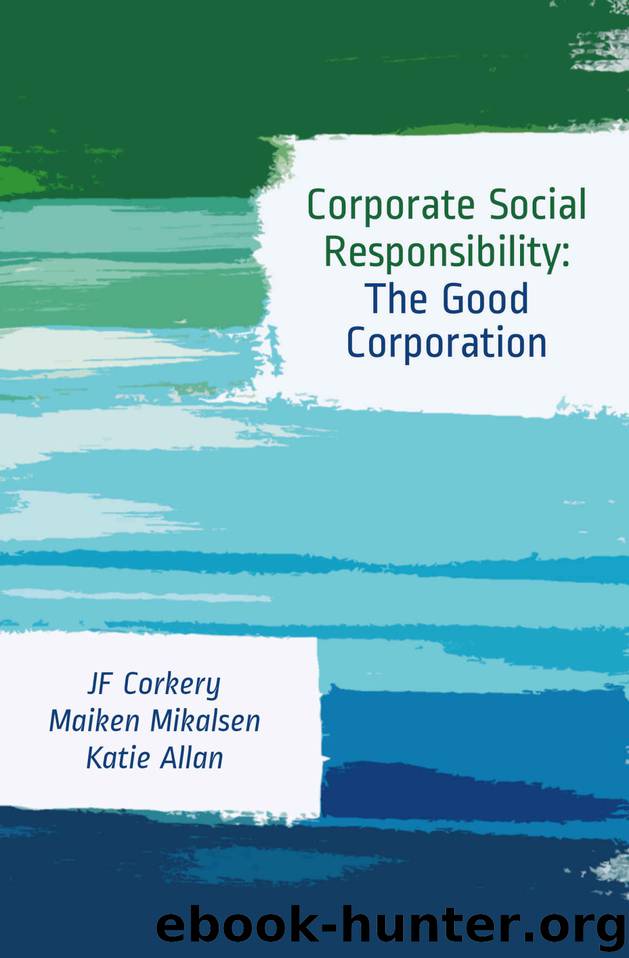Corporate Social Responsibility: The Good Corporation by Corkery Jim & Mikalsen Maiken & Allan Katie

Author:Corkery, Jim & Mikalsen, Maiken & Allan, Katie [Corkery, Jim]
Language: eng
Format: epub
ISBN: 9781925427226
Publisher: Australian eBook Publisher
Published: 2017-01-10T05:00:00+00:00
3. Comparative Reflections
Socio-economic backgrounds drive different concepts of what constitutes CSR, different drivers of CSR in the community and different ways of implementing CSR in different countries. Let’s summarise the differences and similarities:
A differing factor is first of all the role of the government in the CSR-scheme. Many of the European countries, such as the UK, Norway, France and China allow strong governmental intervention, which also shines through in their approaches to CSR. Others, such as the United States, Chile, Brazil and Germany, have a tradition of less government involvement. They are more dependent on NGOs and/or national companies to drive CSR.
There is a clear distinction between the developed and the developing countries. In the developing countries, CSR initiatives are more driven by communities’ basic needs than in the developed countries; 272 also more centred on philanthropy and charity work. Developed countries can go further with CSR than underdeveloped nations. Developing countries are, however, keen. They make significant efforts to catch up and, sometimes, to lead. India, for example, is bold in its legislative approach, with an allocation of 2% of larger companies’ net profits to CSR. It also appears to be easier to implement CSR in a country, if international human rights are recognised by the national government.
Another difference is the presence and role of the NGOs, the non-governmental, not-for-profit, service and humanitarian groups. Active NGOs foster CSR activity. Many CSR schemes come about from companies and NGOs working together. The energies of NGOs and their community support vary. In the USA, the NGOs are an important driver of CSR. In Germany they have played more the role of a watchdog, overseeing corporate activities. Some countries, like China, have traditionally not been driven by NGOs when it comes to CSR. This is changing as more and more NGOs promoting CSR emerge.
Also, there are differences regarding the countries’ legislation. Some countries such as Australia, Germany and Norway have chosen not to legislate for CSR, for now, and let it be rolled out by industry in response to global standards. Other countries do have thorough legislation on elements of CSR, such as labourers’ rights and pollution. Other countries, such as France, Indonesia and the UK, have detailed legislation on companies’ responsibilities in the community and on sustainable practice. For a few countries, such as India and Indonesia, the government has tied sanctions to the legislation, to give it more bite.
A comparison between the US and Indonesia shows that hard law isn’t always the answer. Corporations can drive CSR, seemingly more than governments can. Indonesia may have the right laws. Time will tell whether their corporate attitude can change, and whether the state has sufficient power to enforce the rules, a common challenge for developing nations. The US, on the other hand, is showing that the ‘free market’ approach to CSR might work. MNEs, of course, must comply with the laws of many jurisdictions. It’s also possible that the US is riding off the back of UK and EU regulations.
There are also differences in how the countries view and define CSR.
Download
This site does not store any files on its server. We only index and link to content provided by other sites. Please contact the content providers to delete copyright contents if any and email us, we'll remove relevant links or contents immediately.
International Integration of the Brazilian Economy by Elias C. Grivoyannis(57418)
The Art of Coaching by Elena Aguilar(50140)
Flexible Working by Dale Gemma;(22955)
How to Stop Living Paycheck to Paycheck by Avery Breyer(19223)
The Acquirer's Multiple: How the Billionaire Contrarians of Deep Value Beat the Market by Tobias Carlisle(11683)
The Radium Girls by Kate Moore(10929)
Thinking, Fast and Slow by Kahneman Daniel(10640)
The Art of Thinking Clearly by Rolf Dobelli(8878)
Hit Refresh by Satya Nadella(8347)
The Compound Effect by Darren Hardy(7586)
Atomic Habits: Tiny Changes, Remarkable Results by James Clear(7242)
Turbulence by E. J. Noyes(7062)
Tools of Titans by Timothy Ferriss(6976)
How to Be a Bawse: A Guide to Conquering Life by Lilly Singh(6707)
Change Your Questions, Change Your Life by Marilee Adams(6668)
Nudge - Improving Decisions about Health, Wealth, and Happiness by Thaler Sunstein(6647)
Win Bigly by Scott Adams(6330)
The Black Swan by Nassim Nicholas Taleb(6211)
A Court of Wings and Ruin by Sarah J. Maas(6124)
